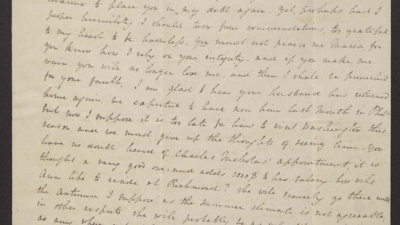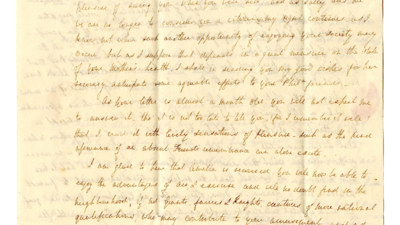Program of Remembrance for His Excellency Ariel Sharon, New York, 2014
Title
Date
Summary
This document is a program for a "Remembrance" event held on Wednesday, February 26, 2014, at the Fifth Avenue Synagogue in New York City, honoring the late Israeli Prime Minister Ariel Sharon. The program outlines a series of tributes, musical performances, and prayers. It includes segments such as a performance of "Kaddish," words of tribute from notable figures like Ambassador Ido Aharoni and Malcolm Hoenlein, and a rendition of Natan Alterman's poem "The Silver Platter." Personal reflections are offered by Professor Elie Wiesel, Gilad Sharon (Ariel Sharon's son), and Ira Rennert. The program also features memorial prayers, including the Mourner's Kaddish, Prayer for the State of Israel, and Hatikvah. Several prominent Jewish American organizations, alongside the Consulate General of Israel in New York, are listed as participating organizations. The document concludes with an invitation to a reception sponsored by Ingeborg and Ira Rennert, celebrating Sharon's life and legacy. Full texts of "The Silver Platter" and the Hebrew prayers are provided in both English and Hebrew.
More Sources Like This
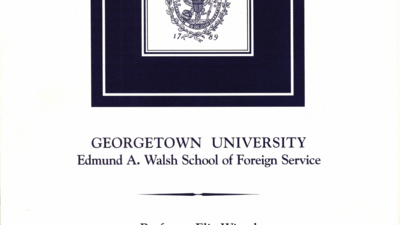
This document is a program for an event held at Georgetown University's Edmund A. Walsh School of Foreign Service on May 1, 2002, featuring Professor Elie Wiesel. The program includes an "Order of Exercise" outlining the welcome, introduction, address by Elie Wiesel, and closing remarks. It provides a detailed biography of Elie Wiesel, highlighting his work as a Nobel Peace Prize laureate, Holocaust survivor, author, teacher, and advocate for human rights and peace. It mentions his various academic positions, awards, and literary works such as "Night." The program also features a section on the Thomas J. Ernst Family, who sponsored Professor Wiesel's visit, detailing their philanthropic activities and biographical information for Thomas J. Ernst, Joanna Valgenti Ernst, Joseph Ernst, and Benjamin Ernst, emphasizing their backgrounds and contributions, particularly in areas of civil rights, education, and humanitarian efforts. The document also includes text from an older honorary degree conferral by Georgetown University to Elie Wiesel.
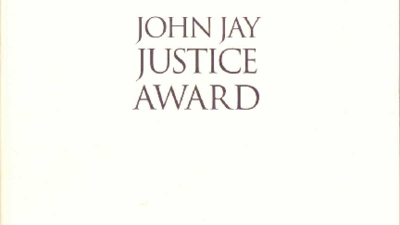
This document is a program for the 2014 John Jay Justice Awards, held on May 6, 2014. The event honors Elie Wiesel for his profound dedication to justice and human rights, a commitment deeply rooted in his experiences as a Holocaust survivor. The program features a welcome message from Jeremy Travis, President of John Jay College, alongside a detailed biography of Wiesel, highlighting his literary works, academic career, and human rights advocacy. It also explains the significance of the John Jay Medal for Justice. The program outlines the ceremony's schedule, including performances and presentations by notable figures such as Stephen G. Breyer, Sir Patrick Stewart, James Earl Jones, Simon Estes, Gil Shaham, Akira Eguchi, Anthony McGill, and Jessye Norman. Biographical sketches of these presenters and participants are provided. The document concludes with acknowledgments to key contributors, including Anne Beane Rudman for underwriting the event and Caroline Stoessinger for producing the program, and lists the members of the John Jay College Foundation Board of Trustees.
of
Marian Filar
Born December 17, 1917 in Warsaw, Poland, Marian Filar was a member of a musical and religious Jewish family who became a child prodigy and a noted concert pianist and teacher. His father was a manufacturer and his grandfather was a rabbi. He studied at the Warsaw and Lemberg conservatories and graduated from Gymnasium in Warsaw. In September, 1939, he fled to Lemberg following the German invasion. After graduation from the Lemberg Conservatory in December, 1941, he rejoined his family in the Warsaw Ghetto. He worked with a labor group taken outside the ghetto to a railroad workplace in Warsaw West. He describes severe beatings by S.S. guards and his rescue by a Polish railway man. He details his solo performance and other symphony concerts in the ghetto by Jewish musicians, often playing music by forbidden composers. He mentions ghetto deportations, 1942-43, when his parents and siblings were taken.
In May, 1943, after the ghetto uprising, he was deported to Majdanek. After beatings and near-starvation, he volunteered for a labor camp in Skarzysko-Kamiena, where he received aid from a fellow worker who was Polish. Moved to Buchenwald in August 1944, he was housed in a tent camp with Leon Blum, Deladier and other prominent politicians and clerics. Mr. Filar was moved next, by train, to Schlieben, near Leipzig, to work in a bazooka factory, where a Polish kitchen maid gave him extra food. His piano playing impressed the German civilian camp supervisor who transferred him to an easy job to protect his hands. As the war front moved near, he was sent with other prisoners by train to Bautzen and then on a death march to Nicksdorf (Mikulasovice) in Czechoslovakia. He and two brothers survived and lived in Zeilsheim Displaced Person’s camp in Germany for two and a half years.
After liberation, he performed in concerts through Western Europe and toured Israel, playing with the Israeli Philharmonic during the war in 1956. He shares a moving vignette about going to Professor Walter Gieseking’s villa and auditioning to become his student. He studied with him for five years.He emigrated to the USA in 1950, where he played with many American orchestras, headed the piano department at Settlement Music School in Philadelphia, and joined the faculty at Temple University. After retirement, he taught privately and judged international piano competitions.
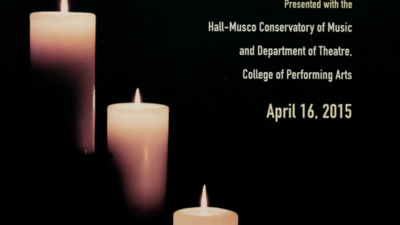
This document is a program for "An Evening of Holocaust Remembrance" held at Chapman University on April 16, 2015. The event, presented by the Hall-Musco Conservatory of Music, Department of Theatre, and the Rodgers Center for Holocaust Education, featured a series of performances, readings, and reflections. Highlights included a welcome by Dr. Daniele Struppa, musical excerpts by various composers performed by artists such as Iman Khosrowpour and Summer Hassan, and readings from the works of Elie Wiesel by students and faculty. The program also included a lighting of commemorative candles and reflections by Dr. Marilyn Harran and Dr. Gail Stearns, with Nobel Peace Prize Laureate Elie Wiesel present as a Distinguished Presidential Fellow. The document details biographies of the speakers, performers, and production team, emphasizing the event's focus on memory, justice, and human rights in the context of the Holocaust, commemorating the millions who perished and honoring survivors and liberators.
